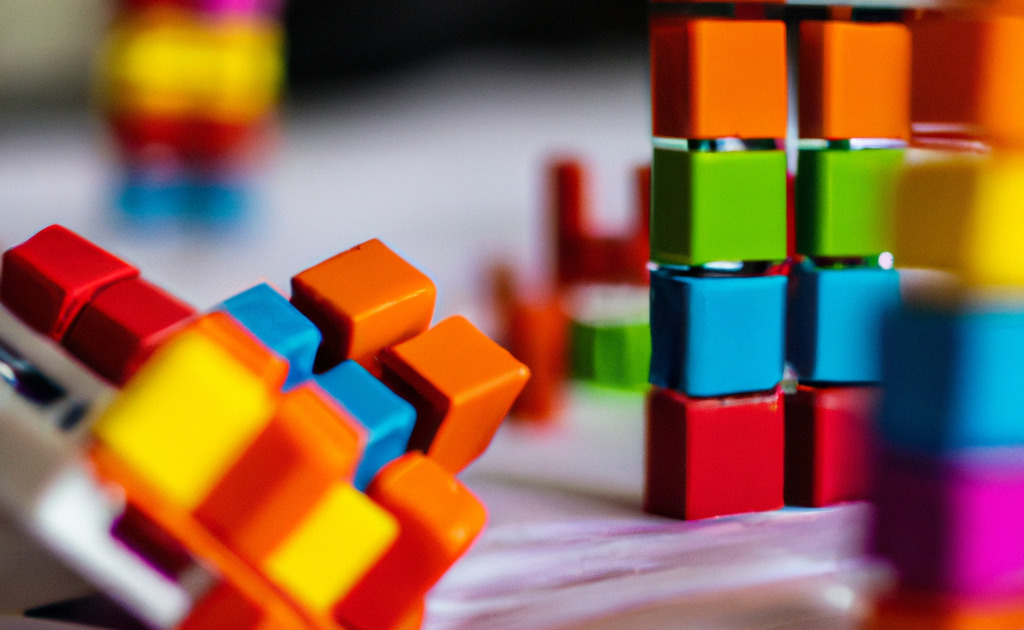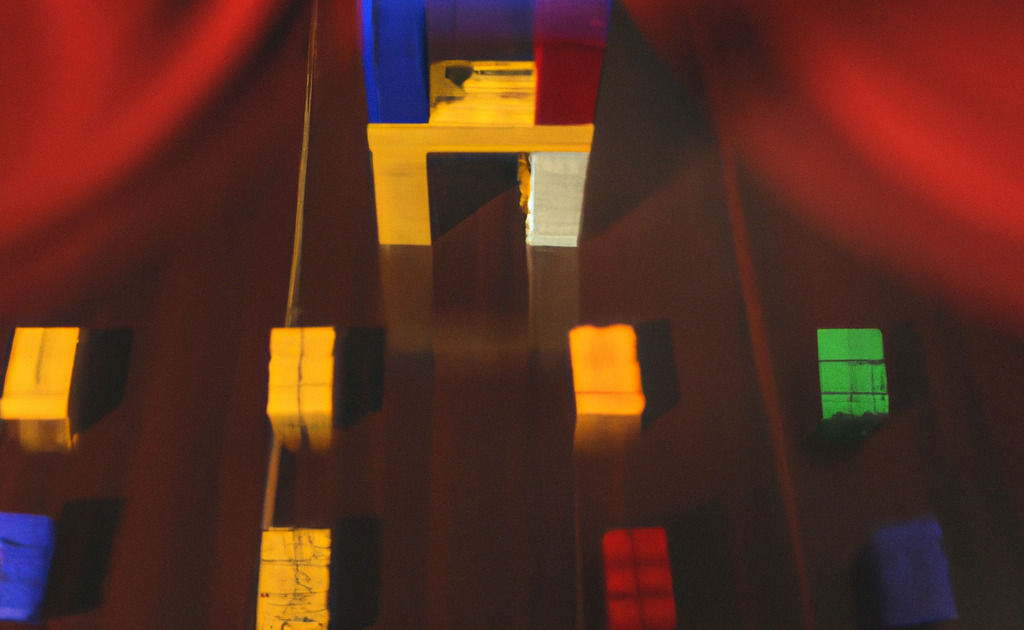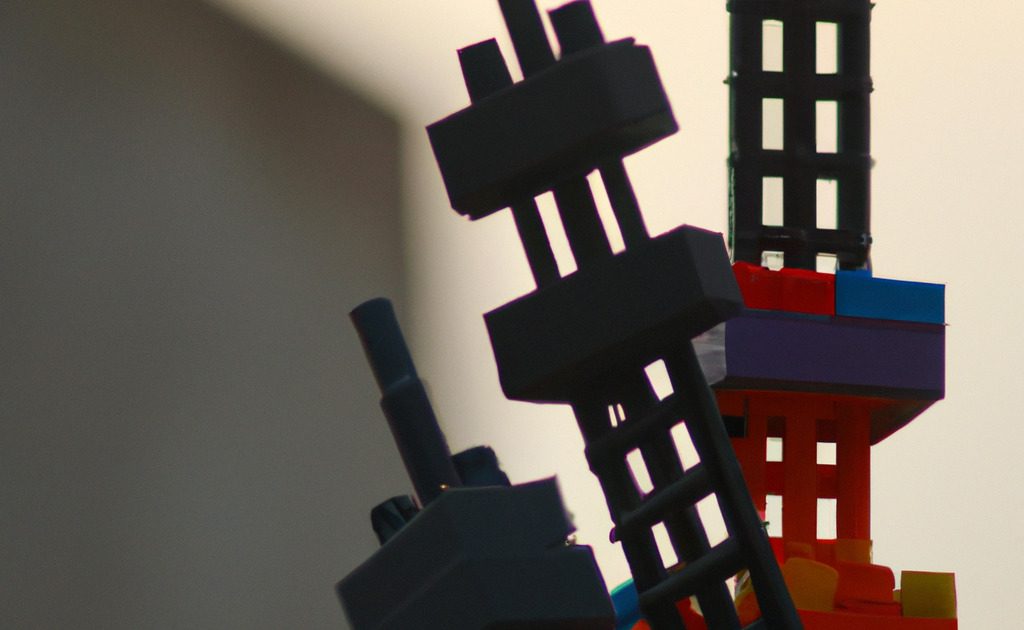Building blocks have been a staple in the world of toys and games for decades. These simple yet versatile toys have captivated the imaginations of children and adults alike, offering endless possibilities for creativity and learning.
In today’s fast-paced digital age, where screens dominate our lives, building block games provide a refreshing break from technology. They offer a hands-on, tactile experience that engages multiple senses and promotes cognitive development.
But what makes building block games so special? How do they unleash creativity and foster learning? In this article, we will delve into the fascinating world of building block games and explore their profound impact on child development and education.
From the iconic LEGO bricks to the innovative magnetic tiles, building block games come in various shapes, sizes, and materials. They allow children to construct and deconstruct, encouraging experimentation and problem-solving skills.
One of the key benefits of building block games is their ability to stimulate creativity. Unlike pre-designed toys, building blocks empower children to build whatever they can imagine. The open-ended nature of these games nurtures divergent thinking and encourages out-of-the-box solutions.
As children engage with building block games, they learn valuable lessons about spatial awareness, balance, and proportion. They develop fine motor skills as they manipulate the blocks, improving hand-eye coordination and dexterity.
Moreover, building block games foster social interaction and collaboration. When children build together, they learn to communicate, negotiate, and share ideas. They develop teamwork and problem-solving skills, laying the foundation for future success in various aspects of life.
Building block games also have a significant impact on cognitive development. They enhance logical thinking and reasoning abilities as children plan, organize, and execute their designs. These games promote critical thinking, as children learn to anticipate the consequences of their actions and make adjustments accordingly.
In addition to cognitive benefits, building block games support language development. As children engage in imaginative play with their creations, they naturally engage in storytelling. This helps them develop vocabulary, narrative skills, and the ability to express their thoughts and ideas.
Furthermore, building block games can be used as educational tools in various subjects. Teachers and parents can incorporate these games into lessons on math, science, engineering, and even history. By integrating play and learning, children develop a deeper understanding of complex concepts.
In conclusion, building block games are much more than just toys. They are powerful tools that unleash creativity, promote learning, and foster holistic child development. By providing a hands-on, interactive experience, these games engage children’s minds and bodies, allowing them to explore, experiment, and grow.
So, whether you’re a parent looking for an educational toy or an educator seeking innovative teaching tools, consider the endless possibilities that building block games offer. Let’s embrace the world of building blocks and unlock the boundless potential of young minds!
The Power of Imagination
At the heart of building block games lies the power of imagination. These simple, colorful blocks have the ability to transform into anything a child can dream of. From towering skyscrapers to fantastical creatures, the possibilities are endless. When children engage with building blocks, they are not just playing with toys; they are creating entire worlds in their minds.
Unleashing Creativity
Building block games provide a blank canvas for children to unleash their creativity. Unlike other toys that come with predetermined rules and limitations, building blocks offer complete freedom. Children can experiment with different combinations, shapes, and structures, giving life to their wildest ideas. This freedom to create fosters a sense of ownership and pride in their creations.
Problem-Solving and Critical Thinking
As children engage in building block games, they encounter various challenges and obstacles. They learn to think critically and problem-solve as they figure out how to make their structures stable, balance different components, and overcome design flaws. These games encourage children to analyze, strategize, and find innovative solutions to achieve their desired outcomes.
Spatial Awareness and Motor Skills
Building block games require children to visualize and manipulate objects in three-dimensional space. As they stack, connect, and arrange the blocks, they develop spatial awareness and an understanding of geometry. These games also enhance fine motor skills as children use their fingers to grasp and position the blocks with precision.
Social Interaction and Collaboration
Building block games are not limited to solitary play. They provide opportunities for social interaction and collaboration. When children build together, they learn to communicate their ideas, listen to others, and work as a team. They learn to share resources, negotiate roles, and compromise, fostering important social skills that are essential for future relationships and collaborations.
Emotional Development
Building block games can also have a positive impact on emotional development. As children engage in imaginative play with their creations, they express their emotions and explore different scenarios. They may build a fortress to feel safe or create a story that reflects their feelings. This form of play allows children to process and understand their emotions in a safe and creative way.
Cross-Curricular Learning
Building block games offer a unique opportunity for cross-curricular learning. They can be incorporated into various subjects, making learning more engaging and interactive. For example, in a math lesson, children can explore concepts of symmetry and patterns by building symmetrical structures. In a science lesson, they can experiment with balance and stability. These games bridge the gap between theoretical knowledge and practical application.
Inclusive and Accessible
One of the remarkable aspects of building block games is their inclusivity and accessibility. Regardless of age, gender, or ability, anyone can engage with these toys. Building blocks provide a level playing field where everyone can participate and contribute. They promote diversity, collaboration, and the celebration of unique perspectives.
Beyond Childhood
The benefits of building block games extend beyond childhood. The skills and qualities developed through these games, such as creativity, critical thinking, and collaboration, are transferable to various aspects of life. Architects, engineers, designers, and innovators often credit their early experiences with building blocks as the foundation for their careers. Building block games lay the groundwork for a lifelong love of learning and exploration.

Building Blocks in Education
Building block games have gained recognition in the field of education for their immense educational value. Educators have embraced these games as valuable tools to enhance learning outcomes and engage students in a hands-on, interactive way.
Mathematics and Logic
Building block games provide an excellent platform for teaching mathematics and logic. Children can explore concepts such as counting, sorting, and patterns by arranging blocks in different sequences. They can also learn about symmetry, spatial relationships, and geometric shapes by constructing various structures. These games make abstract mathematical concepts tangible and accessible, allowing students to grasp them more easily.
Science and Engineering
In the realm of science and engineering, building block games offer endless possibilities for experimentation and exploration. Students can build simple machines, test the laws of physics, and understand concepts like balance and stability. They can also engage in engineering challenges, designing and constructing structures that can withstand different forces. These games encourage students to think like scientists and engineers, fostering a passion for these fields.
Language and Literacy
Building block games can also support language and literacy development. Through imaginative play with their creations, children naturally engage in storytelling, which helps develop their vocabulary, narrative skills, and ability to express themselves. Educators can incorporate building blocks into language lessons, encouraging students to build scenes from a story or create their own narratives. This integration of play and language learning enhances students’ communication skills and fosters a love for storytelling.
Social Studies and History
Building block games can bring history and social studies to life. Students can recreate historical events or build models of famous landmarks, deepening their understanding of the past. They can also construct scenes from different cultures and explore concepts of diversity and inclusivity. These games allow students to engage with history and social studies in a tangible and interactive way, making the subject matter more engaging and memorable.
Creativity and Innovation
Building block games are renowned for their ability to foster creativity and innovation. In an educational setting, these games encourage students to think outside the box, explore unconventional solutions, and take risks. Students can engage in design challenges, where they have to build structures that meet specific criteria or solve real-world problems. These challenges promote critical thinking, problem-solving, and the development of an innovative mindset.
Collaboration and Teamwork
Building block games provide an ideal environment for students to develop collaboration and teamwork skills. Group projects that involve building complex structures require students to communicate effectively, listen to others’ ideas, and work together towards a common goal. These games teach students the importance of cooperation, compromise, and respecting diverse perspectives. They lay the foundation for successful teamwork in future academic and professional endeavors.
Hands-On Learning
One of the key advantages of building block games in education is their hands-on nature. These games provide a break from traditional classroom instruction and allow students to engage in kinesthetic learning. By physically manipulating the blocks and constructing their ideas, students develop a deeper understanding of concepts and retain information more effectively. This hands-on approach promotes active learning and helps students make meaningful connections between theory and practice.
Inclusive Education
Building block games promote inclusive education by accommodating diverse learning styles and abilities. They provide multiple entry points for students to engage with the material, regardless of their strengths or challenges. Visual learners can benefit from the visual representations of concepts through the blocks, while kinesthetic learners can engage in hands-on exploration. These games also support students with special needs by providing a multisensory and adaptable learning experience.
Choosing the Right Building Block Games
With the wide variety of building block games available in the market, it can be overwhelming to choose the right one for your child or classroom. Here are some factors to consider when selecting building block games:
Age Appropriateness
Different building block games are designed for specific age groups. Consider the developmental stage of your child or students and choose games that align with their abilities and interests. Younger children may benefit from larger blocks that are easier to handle, while older children may enjoy more complex sets with intricate designs.
Educational Value
Look for building block games that offer educational value beyond just play. Consider games that promote specific skills or subjects, such as STEM concepts, language development, or problem-solving. Read reviews and product descriptions to ensure that the games align with your educational goals.
Quality and Durability
Building block games should be made of high-quality materials that can withstand frequent use. Look for games that are durable, non-toxic, and free from small parts that can be a choking hazard. Investing in well-made building block games ensures that they will last for years and can be passed down to future generations.
Versatility and Expandability
Consider building block games that offer versatility and expandability. Some games come with additional sets or accessories that allow children to build more complex structures or explore different themes. This not only keeps the games engaging for longer but also encourages creativity and imagination.
Open-Ended Play
Choose building block games that promote open-ended play. These games should allow children to build and create without limitations or predetermined outcomes. Open-ended play fosters divergent thinking, problem-solving, and the development of unique ideas. It encourages children to take risks and explore their own interests.
Safety Considerations
Ensure that the building block games you choose meet safety standards and regulations. Look for games that have been tested and certified for safety. Check for any warnings or age restrictions provided by the manufacturer. It is important to prioritize the safety of children while they engage in play.
Integration with Other Toys and Materials
Consider how building block games can be integrated with other toys and materials. Some games are compatible with other building block sets, allowing for even more possibilities and creativity. Additionally, think about how building block games can be combined with other educational materials, such as books, puzzles, or art supplies, to create a holistic learning experience.
Encouraging Play and Exploration
Once you have chosen the right building block games, it is essential to create an environment that encourages play and exploration. Provide ample time and space for children to engage with the games. Encourage them to experiment, take risks, and learn from their mistakes. Celebrate their creations and provide opportunities for them to share their ideas and stories.
In conclusion, building block games have proven to be invaluable tools for unleashing creativity and promoting learning. These simple yet versatile toys offer a wide range of benefits for children of all ages. From enhancing cognitive skills to fostering social interaction and collaboration, building block games provide a holistic approach to child development.
Through building block games, children learn to think critically, problem-solve, and express their ideas. They develop spatial awareness, fine motor skills, and a deep understanding of various subjects. These games also promote creativity, innovation, and a love for learning.
Moreover, building block games have found their place in the educational landscape. Teachers and parents recognize the immense value these games bring to the classroom and home environment. By integrating play and learning, building block games make education more engaging, interactive, and effective.
The benefits of building block games extend beyond childhood. The skills and qualities developed through these games lay the foundation for future success in various fields. Architects, engineers, designers, and innovators often credit their early experiences with building blocks as the catalyst for their careers.
So, whether you are a parent looking for an educational toy or an educator seeking innovative teaching tools, consider the endless possibilities that building block games offer. Embrace the world of building blocks and unlock the boundless potential of young minds.
Can you imagine a world where every child has the opportunity to unleash their creativity, learn through play, and develop the skills needed to thrive in the 21st century?

Language learning toys are a great way to make the process of learning a new language fun and engaging. Whether it’s through interactive games or immersive activities, these toys provide an interactive and hands-on approach to language acquisition. Check out language dice games that offer a playful way to practice vocabulary and sentence construction.

Language learning is a crucial skill that opens doors to new cultures and opportunities. To make the language learning journey more exciting, consider incorporating word formation games into the process. These games not only reinforce vocabulary but also enhance grammar skills. Discover the benefits of word formation games and how they can boost language proficiency.

Science kits play a vital role in engaging children in hands-on learning experiences. One fascinating area of study is soil science, which offers a deeper understanding of the earth’s ecosystems. Soil science kits provide children with the tools and knowledge to explore the wonders beneath their feet. Unearth the wonders of soil science with soil science kits and inspire a love for environmental science.


